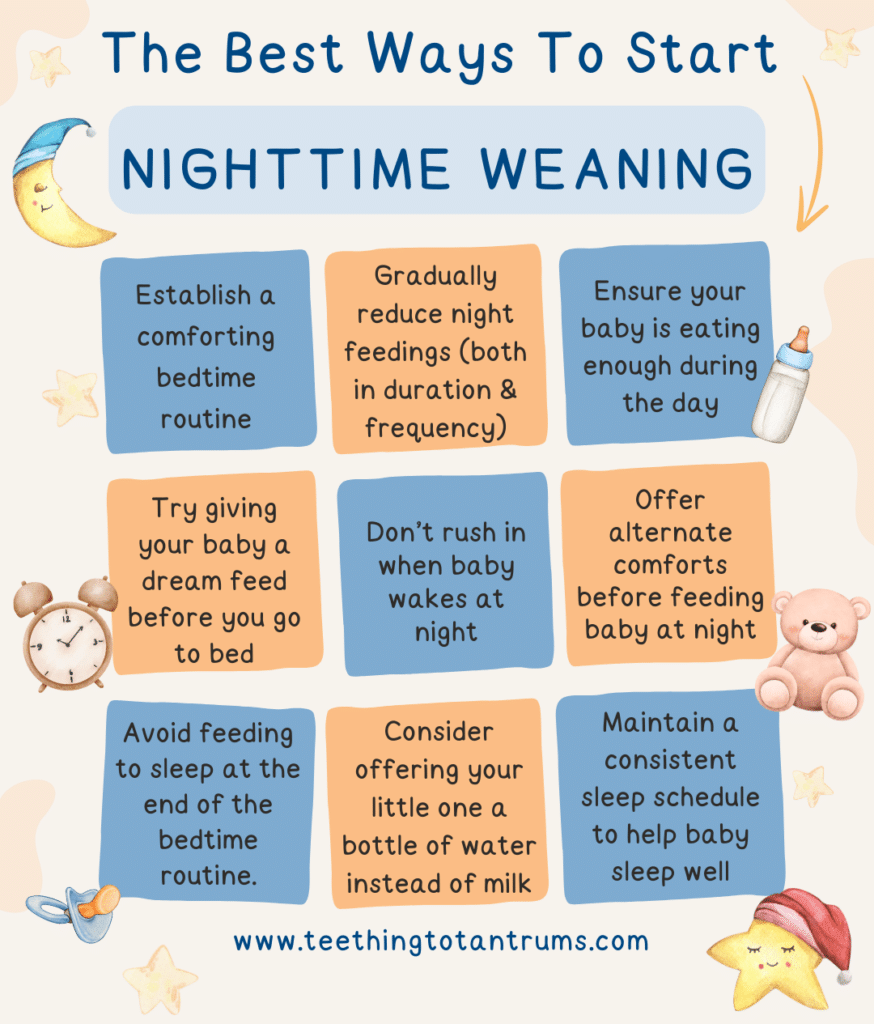Getting your baby to sleep through the night is a big milestone in their development and knowing how and when to drop nighttime feeds is key to your success.
While some babies will naturally drop their nighttime feeds and sleep for longer periods without prompting… others will require a bit of help to learn how to get through the night without the comfort of a feed.
If your baby falls into the latter, you will need to start night weaning.
In particular, gentle night weaning.
In today’s article, I will explain what gentle night weaning is, how it’s crucial to your success for nighttime weaning, how you implement it at different ages, and how to manage any hiccups you may encounter on your journey to a feed-free night.
Ready to get started? Great! Let’s dive right in.

Table of Contents
What Is Gentle Night Weaning?
Gentle night weaning is a process of teaching a baby to sleep through the night without requiring a feed that respects your baby’s needs and emotions. Unlike traditional night weaning methods that involve a sudden stop and crying-it-out, gentle night weaning involves gradually reducing the need for a bottle or breast at night through the use of comfort items, reassuring touches, and verbal encouragement. This helps your little one adjust more easily to changes in their nightly routine without panicking.
At What Age Can You Start Night Weaning?
Deciding when to start night weaning your child can vary greatly. It often depends on your child’s developmental stage, their individual needs, and your personal wishes.
As a rule of thumb, you can begin the night weaning process around six months of age, once your baby starts consuming more solid foods and less milk.
However, in my experience, some babies are able to sleep through the night without a feed before this.
To decide whether it’s the right time to start night weaning your little one, take these two important signs into account:
- Does your child have a consistent sleep pattern with longer periods of sleep at night? Do they sleep through the night occasionally?
- Is your baby at a healthy weight? You should consult with your pediatrician to determine whether your little one has achieved a weight that indicates they need less feeding at night. If your baby is underweight or small, your pediatrician will suggest continuing with night feeding for a while, regardless of your baby’s age.
Can You Night Wean A Toddler?
Yes, you can night wean a toddler.
Toddlers do not require night feeding for nutritional purposes and above the age of 12 months, the night feeds are definitely a habit that helps them resettle when they wake.
NOTE: The longer you put off night weaning, the harder it is to achieve. This is because once night feeding has become a self-soothing habit rather than a nutritional need, you will need a lot of patience to break the comfort and emotional association that it has for you both.
How To Gently Wean Off Night Feedings
Once the decision to gently night wean your baby has been made, there are 9 steps you must take to give you the greatest chance of success quickly.
I’ve refined these steps over the last 40 years in the childcare industry and they’ve never let me down.
So without further ado, here’s how to gently wean your child off night feedings so you can have a full night’s sleep again!

- Establish a Comforting Bedtime Routine: If you have not done so already begin by creating a calm environment before bedtime which includes a warm bath, a massage, cuddling, singing, and a bedtime story. This routine signals to your baby that sleep time is approaching and sets a foundation for a good night’s rest.
- Gradually Reduce Night Feedings: Slowly decrease the duration of each feeding or the number of times you breastfeed during the night. Try to resettle your baby back to sleep with cuddles or pats, before resorting to a feed. This will reaffirm comfort without relying on feeding.
- Ensure Baby Is Getting Enough Food During The Day: You can also offer an extra feed during the day to ensure your baby’s nutritional needs are met. If your baby is ready for solids then make sure they are getting enough solid foods to complement the milk feeds. A well-fed baby during the day is less likely to wake up hungry at night, easing the transition.
- Introducing Dream Feed: Offering a dream feed before you go to bed can often help your baby sleep for longer periods at night because they will be less likely to wake up hungry which helps break the habit of waking to be fed.
- Don’t Rush In: Once you know that your baby no longer ‘needs’ their night feeds for nutritional purposes, don’t always rush in when they wake. Instead, give your baby the opportunity to resettle themselves first.
- Offer Alternate Comforts First: Night feeding once your baby no longer needs them for nutrition is really a comfort for resettling. Therefore, you will need to teach your baby to resettle without feeding. Offering a pacifier can often help replace the comfort of sucking. Using a white noise machine or sleep app can also offer alternative comfort and block out background noises. Finally, try to resettle your baby without picking them up. Gently pat their tummy to help them go back to sleep without feeding.
- Avoid Feeding To Sleep At Bedtime: If your baby is relying on feeding to fall asleep then helping them to learn to self-soothe when you put them to bed will help. My top trick is to give your baby their final feed at another point in the bedtime routine rather than at the end, ensuring you put your baby down drowsy but not fast asleep. Utilize gentle sleep training methods, white noise machines, or sleep apps to help your baby learn to self-soothe without the need for a feed. This will help your baby wean off night nursing for comfort and resettling.
- Offer Water Instead: Sometimes offering water in a bottle at night instead of offering milk can help break the pattern of waking to be fed at night. You can then gradually reduce the amount of water in the bottle until it’s no longer needed. Here’s how to get a baby to sleep without a bottle.
- Maintain A Consistent Sleep Schedule: Finally, and most importantly, stick to a regular sleep schedule for both nap times and nighttime sleep, and put your baby down to sleep whilst drowsy and not fast asleep. Consistency helps your baby understand and adapt to the patterns of sleeping through the night without interruptions for feeding.
REMEMBER: Gentle night weaning should be a progressive step tailored to suit both you and your baby’s comfort level. It is not something to be rushed and you should take comfort in the fact that you will reach the desired feedfree nights eventually.
Gentle Night Weaning At 6 Months
While some babies can sleep through the night without a feed from as early as 4 months of age, the 6-month mark is a good milestone at which you can safely consider night weaning as most babies are physically able to go through the night without a feed.
This is when reducing nighttime feedings can help your little one achieve longer stretches of sleep.
If you are unsure if your little one can safely drop night feeds you should check with your pediatrician who will assess their weight and general development.
Here are my top tips for gentle night weaning at 6 months of age:
- Gradual Reduction Is Key: To gently wean your baby off night feedings, you will need to gradually reduce the time spent on each feed. For instance, if your baby typically feeds in the night for ten minutes, try cutting it down to eight minutes, then gradually to five. This slow approach can help them adapt without feeling a sudden change.
- Drop One Feed At A Time: If your baby is still waking multiple times to feed at night aim to drop one feed at a time rather than going cold turkey. If you are breastfeeding this will also help your body adjust to feeding less at night and avoid the risk of engorgement.
- Balance With Daytime Feedings: To compensate for the reduced intake at night, ensure your baby gets enough milk during the day. Cluster feeding in the evening or offering a dream feed can also help your baby feel full and satisfied, leading to a better sleep routine. If your baby is old enough to start solids, this can help them sleep for longer periods at night too.
- Consistency With Sleep Training: Combining gentle night weaning with consistent sleep training methods can provide a clear structure for your baby to learn to sleep independently. Establishing a calming bedtime routine that ends with your baby having a story and or lullaby and being put down drowsy but not fast asleep will start to signal that nighttime is meant for sleep, not for feeding. Avoid feeding your baby to sleep at any point as this will only strengthen the feed/sleep association.
- Trust Your Instincts And Recognise Your Baby’s Cues: If your baby is showing signs of hunger or distress, they may not be ready to wean at night fully. By the same token, when they wake at night don’t rush in immediately and offer a feed. Wait to see if they will resettle independently or try to resettle them without a feed.
Remember a gentle approach to night weaning takes time and patience. Each baby’s journey to sleeping through the night is personal and unique.
Looking to get your little one to sleep quickly and effortlessly? Check out my Bedtime and Nap Cheat Sheet and master the art of making daytime naps and bedtimes as seamless as possible.
A bedtime & nap cheat sheet so good your little one will ask you to put them to bed...
Laura Williams "This is a life saver! I'm so glad I downloaded your bedtime & nap cheat sheet. My little one actually asked me to put him to bed last night! Unbelievable! Thank you so much!"
Click Here For The FREE Cheat Sheet
Gentle Night Weaning A 1 Year Old
When your toddler reaches the one-year mark, your child will be experiencing lots of daytime activities and (hopefully) eating a variety of solid foods.
While it is essential to confirm with a healthcare provider that your child is ready to wean and receiving enough nutrition during the day… the majority of 1-year-olds can be safely night weaned and do not need feeding at night for nutritional purposes.
Here’s how to gently night-wean a 1-year-old toddler:
- Understand Your Toddler’s Nutritional Needs: At one year, your toddler’s nutrition includes a balance of solid foods alongside breast milk or formula. Ensure your toddler eats a variety of foods to get all the necessary nutrients. Here’s a rough calculation for how many calories your baby needs per day from milk or food: Newborn – 2 months old = 100-120 kcal/kg/day. Infants of 3-4 months old = 95 kcal/kg/day. Infants, older babies, and toddlers aged 4 months – 3 years = 82 kcal/kg/day.
- Introduce A Comforting Bedtime Routine: As always, a soothing consistent bedtime routine will signal to your toddler that it’s time to sleep. It should not finish with a feed but rather a bedtime story and a cuddle.
- Introduce A Cup For The Last Feed: Offering a cup during the day can help with weaning and reduce the reliance on feeding for comfort. It also helps your 1-year-old feel grown up. I know this can be hard for many parents as the final feed of the day is an emotionally bonding time for you, but it’s an essential step to help break the reliance on nighttime feeds.
- Reduce The Amount Of Milk You Offer: Gradually reduce the amount of milk you offer by giving shorter breastfeeds or smaller formula feeds. You can gradually dilute your child’s formula over a series of nights too. Here’s how to wean your toddler off a bottle at night.
- Manage Sleep Regressions And Night Wakings: Sleep regressions are common around 12 months of age and may cause increased night wakings. Stay patient and consistently comfort your child and try not to feed them to resettle them. Instead, try other methods of soothing like patting their tummy or singing a lullaby.
- Offer Alternative Comfort: When your child wakes at night, wait to see if they will resettle themselves or comfort them with a gentle touch or soft words. This reinforces the concept that nighttime is for sleeping, not eating. Try offering a favorite blanket or soft toy as this can provide comfort without relying on feeding.
It's Time To Say Goodbye To 2 am Wake-Up Calls 🌜👶
In Nighttime Nurturing you'll learn the art of handling nighttime wakings as well as develop your understanding of why nighttime wakings happen to drastically reduce their frequency and focus on gentle yet powerful methods to encourage your little one to sleep through the night
This isn’t about quick fixes; it’s about sustainable changes that foster independence in your child’s sleep habits. Here's what you'll master:
✅ Strategies to reduce the overall frequency of wakings, ensuring more peaceful and solid blocks of sleep for everyone.
✅ Insights into creating a stress-free bedtime routine that sets the tone for a successful night, aligning with natural sleep cycles to become a cherished part of the day.
✅ Techniques to soothe your child back to sleep quickly and gently, minimizing any further disruptions.
✅ Foster a closer, more harmonious relationship with your child by understanding and addressing their sleep needs effectively.
✅ Tools to empower your child to become an independent sleeper, instilling confidence and security in them. Including the 1 KEY skill, you must teach your child to stop them from needing you!
Ready to reclaim your well-earned solid nights of sleep again? Learn more here! 👉
TOP TIP: If your toddler is playing with the teat of the bottle or pausing a lot while feeding from the breast it is a sure sign they are not sucking for hunger but rather for comfort. When you notice these signs it is important to stop the feed and re-settle your little one back to sleep.
Gentle Night Weaning A 2 Year Old
At 2-years-old, your toddler is physically able to sleep through the night without a feed and will be feeding purely from habit.
But a word of warning, the older a child is before they are night weaned the more challenging it can be to break the habit.
So I fully understand if parents have been night feeding their 2-year-olds because it’s easier to feed them and ensure everyone gets some sleep than go through the struggle of night weaning.
Fortunately, there are things you can now do to help your 2-year-old make the transition to dropping their night feeding quickly and without fuss.
- Establish A Routine: Toddlers thrive on predictability. As with every age, create a bedtime routine that does not involve nursing by reading a book or listening to calm music. This helps signal to your child that it’s time to sleep, not feed.
- Offer A Bedtime Snack: Putting your toddler to bed knowing that they are fully fed can help you tackle nighttime wakings with a clear conscience. On top of making sure they have eaten well during the day, offering a milky drink in a cup and a bedtime snack can help your toddler sleep through the night, avoid bedtime stalling, and put your mind at rest so that they will not need to be fed in the night should they wake.
- Reduce Feedings Gradually: A sudden stop to night time feeds can be upsetting. Instead, try dropping one feed at a time over several weeks. This method eases the transition for both you and your toddler, reducing stress and potential resistance. If you are breastfeeding the gradual reduction allows your body to adjust too.
- Offer Alternative Comfort: When your toddler wakes up at night, soothe them back to sleep with patting or singing. Avoid picking them up to the nurse immediately as this helps to break the association between waking up and feeding.
- Encourage Self-Soothing: Offer a favorite toy or blanket for your toddler to sleep with or use sleep apps and audio tapes to settle your toddler as a substitute for feeding. (My son loved listening to audio tapes to fall asleep)
- Offer Water Instead: Another way to help your toddler drop night feeds is to offer them water instead of milk. Keep a sippy cup next to their bed and if they wake during the night, you can offer a drink of water instead.
- Let Your Partner Take A Turn: If you are breastfeeding, getting your partner or family member to deal with night wakings can help break the night-feeding comfort association. At 2-years, the association of your presence with feeding will be so strong that you may find your toddler does not want a feed when a different caregiver resettles them.
- Postpone The Feed: When your toddler wakes and asks for a feed say “Not now” or “Later” and try and settle them by another method.
- Communicate With Your Child: This is very important. At 2-years-old, you can explain the changes to your toddler in a way they can understand. Assure your toddler that they are safe and cared for. Explain how the weaning is a natural progression in their growth to make the transition feel less abrupt. Looking at books together about night weaning can also help. Here are a couple of my favorites:
|
5.0
|
5.0
|
|
"Booby and the Moon" is your heartfelt companion in the delicate dance of night weaning. This touching story, crafted with warmth and care, eases toddlers into the idea of nighttime without nursing. As the moon glows softly in the night sky, a little one learns that comfort and love come in many forms, even as they say goodnight to nursing. This story is a celebration of growth and change, offering a nurturing way to help your child embrace this new stage. With its lyrical narrative and enchanting illustrations, "Booby and the Moon" turns weaning into a positive and memorable experience. This book is ideal for children aged 18 months and older (regardless of whether they're breast or bottle-fed). |
Are you a sleep-deprived parent searching for a gentle way to transition your little one from night feedings? Look no further! "Nursies When the Sun Shines" is your compassionate companion on the journey to peaceful nights. Discover the tender story of a mother who guides her little one through the night-weaning process with love and patience. As the stars twinkle outside, she teaches her child that nursies (breastfeeding) are for when the sun shines, helping her little one understand and embrace this new phase of development together. This beautifully illustrated book is a treasure for any family embarking on the path of night weaning that resonates with both parents and children by framing night weaning as a natural step towards growing up. It's a lovely story and one I recommend to many families who are weaning older toddlers. |
"Booby and the Moon" is your heartfelt companion in the delicate dance of night weaning. This touching story, crafted with warmth and care, eases toddlers into the idea of nighttime without nursing. As the moon glows softly in the night sky, a little one learns that comfort and love come in many forms, even as they say goodnight to nursing.
This story is a celebration of growth and change, offering a nurturing way to help your child embrace this new stage. With its lyrical narrative and enchanting illustrations, "Booby and the Moon" turns weaning into a positive and memorable experience.
This book is ideal for children aged 18 months and older (regardless of whether they're breast or bottle-fed).
Are you a sleep-deprived parent searching for a gentle way to transition your little one from night feedings? Look no further! "Nursies When the Sun Shines" is your compassionate companion on the journey to peaceful nights.
Discover the tender story of a mother who guides her little one through the night-weaning process with love and patience. As the stars twinkle outside, she teaches her child that nursies (breastfeeding) are for when the sun shines, helping her little one understand and embrace this new phase of development together.
This beautifully illustrated book is a treasure for any family embarking on the path of night weaning that resonates with both parents and children by framing night weaning as a natural step towards growing up.
It's a lovely story and one I recommend to many families who are weaning older toddlers.
TOP TIP: The key to gentle night weaning at 2 years is patience and consistency. Once you start the weaning process, it is important not to waver. If you give in once, your toddler will learn that with enough pestering and demanding they will get the result they want!
Frequently Asked Questions About Night Weaning
Night weaning can be a delicate period for both you and your baby. These FAQs aim to clarify some common concerns I have been repeatedly asked about the process.
Q: Will baby naturally drop night feeds?
A: Yes, it’s possible for babies to naturally stop feeding at night as they grow older. Typically, this happens when they’re ready and their nutritional needs change. However, it’s not always predictable, and some babies may need more time to night wean than others.
Q: Is night weaning necessary to get baby to sleep through the night?
A: Night weaning is not always necessary for a baby to sleep through the night, but it can be a helpful step. For some babies, night weaning can help them to learn how to sleep for longer periods at night. However, by the same token, even after night feeds have been dropped your baby may still wake at night for other reasons.
Q: What is the father method of night weaning?
A: The father method of night weaning a baby involves the non-breastfeeding parent taking over nighttime comfort duties. This helps to break the association of waking up with feeding. Your partner can soothe your baby back to sleep without offering the breast (or bottle), which can make weaning smoother.
Q: What are proven strategies for stopping night breastfeeding for a toddler who screams?
A: To stop breastfeeding a toddler at night who screams, you must be very consistent and establish a bedtime routine without breastfeeding. Gradually reduce the time spent nursing each night, and offer comfort in other ways such as using soothing music, gentle touches, and verbal reassurance. You can try some gentle toddler sleep training methods too.
Q: Can you night wean a baby safely while co-sleeping, and if so, how?
A: Yes, it’s possible to night wean while co-sleeping by minimizing nighttime interactions. You can turn away slightly and gently pat your baby instead of nursing them. Co-sleeping and night weaning require clear, safe boundaries and patience as your baby adjusts to the new nighttime boundaries.
Q: How long is the night weaning process expected to take for an 18-month-old?
A: The duration night weaning a toddler takes will vary from child to child, but you can expect it to happen between 2 weeks and 3 months. The older the child, the longer it will take to night wean them. Patience during this transition phase is crucial. Each child adapts differently, so the time frame can be influenced by their temperament and consistency.
Need More Parenting Help?
- Download our FREE Perfect Sleep Cheat Sheet. It’s a free, easy-to-use and proven formula designed for parents of 0-5 year olds to master the art of consistently undisturbed and restful sleep without the yelling, nagging or exhausting long-winded evenings.
- Check out our Parenting Toolbox. You’ll get access to expertly-chosen products that you can guarantee are the best for your little one and your wallet.
- Ready to create the calm, peaceful evenings you deserve? Then checkout our most popular course - The Bedtime Battles Masterclass

A bedtime & nap cheat sheet so good your little one will ask you to put them to bed...
Laura Williams "This is a life saver! I'm so glad I downloaded your bedtime & nap cheat sheet. My little one actually asked me to put him to bed last night! Unbelievable! Thank you so much!"
Click Here For The FREE Cheat Sheet





